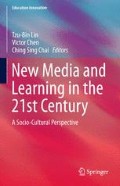Abstract
This chapter reviews the literature that discusses the hopes and concerns related to the implementation of digital textbooks in Korean schools. The digital textbook developed in Korea is a unique digital learning platform that includes both the learning management system and digitised learning resources. It has been developed as a part of ‘Smart Education’ policies planned by the Korean government to meet the needs of twenty-first century learners. Review of the research shows that despite the practical difficulties (e.g. challenges of device procurement), the implementation of digital textbooks has ample potentials to bring about the shift in education paradigm from teacher-led education to student-centred one. However, this chapter warns against a technologically deterministic approach. The implementation of technology itself does not guarantee the paradigm shift. Consistent technical support, development of learning contents and pedagogy for digital textbooks, and media literate teachers and students are amongst the many factors that are necessary to realize the potentials of digital textbooks. This chapter concludes by pointing out that the digital textbook project is not a one-off implementation of a new technology, but rather an attempt to incorporate the new media culture into the school setting to create changes in the teaching and learning culture.
Access this chapter
Tax calculation will be finalised at checkout
Purchases are for personal use only
References
Buckingham, D. (2007). Beyond technology: Children’s learning in the age of digital culture. Cambridge: Polity.
Byun, H.-S., Choi, J.-I., & Song, J.-S. (2006). The research on the prototype development of digital textbook. Journal of Instructional Technology Research, 22(4), 217–224.
Byun, H.-S., Suh, J.-H., Ryu, J.-H., Yang, S.-H., Choi, S.-Y., Jung, M.-S., & Park, M.-H. (2008). A study on the effectiveness of digital textbooks. Seoul: Korea Education and Research Information Service.
Byun, H.-S., Kim, J.-C., Song, Y.-H., & Lee, W.-H. (2010). A study on the effectiveness of digital textbooks. Seoul: Korea Education and Research Information Service.
Eason, G. (2011, October 18). Digital textbooks open a new chapter. BBC News. Retrieved from http://www.bbc.co.uk/news/business-15175962.
Harlan, C., (2012, March 24). In South Korean classrooms, digital textbook revolution meets some resistance. Washington Post. Retrieved from http://www.washingtonpost.com/world/asia_pacific/in-south-korean-classrooms-digital-textbook-revolution-meets-some-resistance/2012/03/21/gIQAxiNGYS_story.html.
Hiemstra, R. (1994). Self-directed learning. In T. Husen & T. N. Postlethwaite (Eds.), The international encyclopaedia of education (2nd ed.). Oxford: Pergamon Press.
Ihm, H.-J. (2011). A study of the differentiated digital elementary English textbook in terms of constructivism and interaction theory. Primary English Education, 17(1), 253–271.
Jenkins, H. (2006). Confronting the challenges of participatory culture: Media education for the 21st century (White paper). Chicago: The MacArthur Foundation.
Johns, L. (2007). The student-centered classroom. New York: Cambridge University Press.
Joo, H.-M. (2012). Development of the criteria and process to evaluate digital textbooks for smart education. Seoul: Korea Institute for Curriculum and Evaluation (KICE).
Jung, S.-M., & Lim, K.-B. (2009). Leading future education: Development of digital textbooks in Korea. Paper presented at the 12th UNESCO-APEID international conference quality innovations for teaching and learning, Bangkok, Thailand.
Kim, J., & Jung, H.-Y. (2010). South Korean digital textbook project. Computers in the Schools, 27(3–4), 247–265.
Korea Education and Research Information Service (KERIS). (2007). 2007 White paper on education informalization, Seoul, South Korea.
Lee, O. (2008, March 24–26). Digital textbook in Korea: Technology’s role in improving access and quality. Power point slide presented at the Asia-Pacific leaders forum on secondary education. New Delhi, India.
Leem, J.-H. (2010). Digital textbooks in elementary school classes: Issues and challenges. Korean Educational Forum, 9(1), 87–114.
Leem, J., Lim, B., & Kim, S. (2008). Development of teaching and learning methods based on ‘activities’ using digital textbook. The Journal of Educational Information and Media, 14(4), 27–52 (Seoul, South Korea).
Lim, Cheol-Il. (2010). Changes in the ubiquitous learning paradigm and the digital textbook (Teacher training document). Retrieved from http://www.keris.or.kr/data/dt_research.jsp?No=1.
Maynard, S., & Cheyne, E. (2005). Can electronic textbooks help children to learn? [Electronic version]. The Electronic Library, 23(1), 103–115.
Ministry of Education, Science, Technology (MEST). (2011). Smart education promotion plan. Seoul: Ministry of Education, Science, Technology (MEST).
Ministry of Education, Science, Technology (MEST). (2012). 2012 Plan for development and application of digital textbooks. Seoul, South Korea.
Nam, Y.-S. (2012, January 21). Digital textbook experiments in Korea ‘just starting’. Dong-a Daily.
NIDA. (2010). Survey on the computer and internet usage. Seoul: Ministry of Information and Communication, National Internet Development Agency of Korea.
Noh, K.-H., Kim, B.-J., & Lee, W.-H. (2011). A study on the effectiveness of digital textbooks. Seoul: Korea Education and Research Information Service.
Rallis, S. F. (1995). Creating leaner centered schools: Dreams and practices. Theory and Practice, 34(4), 224–229.
Sutherland, R., et al. (2004). Transforming teaching and learning: Embedding ICT into everyday classroom practices. Journal of Computer Assisted Learning, 20, 413–425.
Taizan, Y., Bhang, S., Kurokami, H., & Kwon, S. (2012). A comparison of functions and the effect of digital textbook in Japan and Korea. International Journal for Educational Media and Technology, 6(1), 85–93.
Author information
Authors and Affiliations
Corresponding author
Editor information
Editors and Affiliations
Rights and permissions
Copyright information
© 2015 Springer Science+Business Media Singapore
About this chapter
Cite this chapter
Jeong, H., Kim, A. (2015). The Digital Textbook in South Korea: Opportunities and Challenges. In: Lin, TB., Chen, V., Chai, C. (eds) New Media and Learning in the 21st Century. Education Innovation Series. Springer, Singapore. https://doi.org/10.1007/978-981-287-326-2_6
Download citation
DOI: https://doi.org/10.1007/978-981-287-326-2_6
Published:
Publisher Name: Springer, Singapore
Print ISBN: 978-981-287-325-5
Online ISBN: 978-981-287-326-2
eBook Packages: Humanities, Social Sciences and LawEducation (R0)

